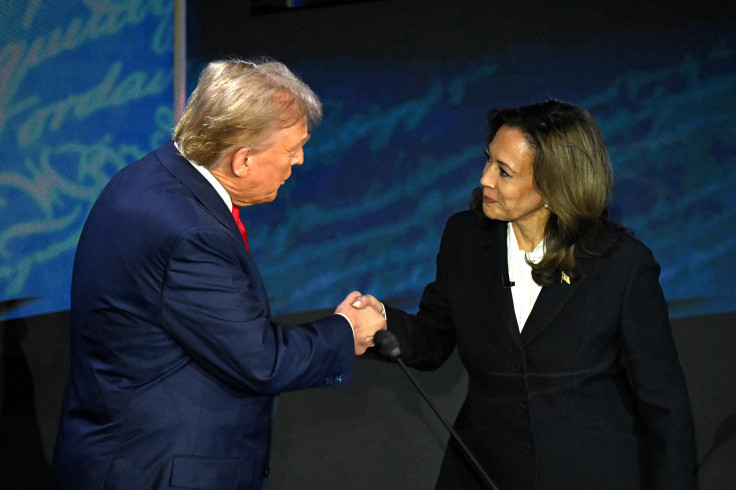
More voters in battleground states trust former President Donald Trump to effectively handle foreign policy issues over Vice President Kamala Harris, though more voters nationwide trust her to do the same, according to a new poll.
The new survey comes from The Institute for Global Affairs, which polled 1,865 voting-age adults in the U.S.— 1,000 of which were from six battleground states— between August 15-22. The margins of error both nationally and in the pooled swing states are plus or minus 3.9 percentage points.
The study reveals that 58% voters in the swing states of Arizona, Georgia, Michigan, Nevada, Pennsylvania and Wisconsin think Trump would handle foreign policy affairs better, particularly in ending the wars in Ukraine and Gaza, respond effectively to a potential Chinese attack on Taiwan and advance U.S. interests internationally. By comparison, 42% of voters in those states say the same of Harris.
Voters in these states also favor Trump on immigration policy, at 56% to Harris' 44%. This comes as no surprise given both immigration and the economy have become central to the former president's campaign, and polls have consistently shown a preference for the former President on these issues.
The gap is more narrow looking at voters nationwide. When asked the same question, 52% believed Harris would be more effective in foreign policy, compared to Trump's 48%.
Harris also leads the GOP candidate nationally on the questions of who would respond more effectively to a major global crisis (52% to 48%) or improve America's reputation (53% to 47%). But those gaps are once again wiped out when zooming in on the swing states, the poll suggests.
These figures could strengthen Trump's chances in the battleground states, as independent voters tend to be inclined to strategies that deal with less interference.
"We've seen that independents in battleground states tend to prefer less interventionist foreign policy," said Mark Hannah, a senior fellow at the Institute for Global Affairs. "So the fact that voters see Trump as more likely to end the wars in Ukraine and Gaza might strengthen his popularity."
Foreign policy, with the exception of immigration, has not been a major issue for voters this cycle. But that hasn't stopped the former President from bombarding voters with his foreign policy plans for months, Axios reports.
From the campaign trail, Trump has raised concerns that the U.S. is paying too much to support Ukraine, and he has promised again to withdraw from the Paris Climate Accords. He has also floated the idea of a 10% tax on imports from all countries and a much higher tax on China, echoing at rallies that "China is eating our lunch."
Despite these messages seemingly resonating with voters in battleground states, experts worry about his goals.
John Simon, who served as ambassador to the African Union in the Bush administration, told NPR back in June that he worries a second Trump administration would dismantle the fabric of American foreign policy.
"My great fear is that a second Trump administration would have all the hallmarks of his first administration without any of the guardrails that were provided by the more experienced foreign policy folks who are around him," Simon said. "He would be like a child without any parents to stop him from doing really bad things."
On the other hand, Harris' plans seem less well-defined to voters. On the war in Gaza, for instance, she has not directly answered the question on whether she would continue sending military aid to Israel. But she has hinted at doing so, while also highlighting the suffering of Palestinians.
"Let me be clear, I will always stand up for Israel's right to defend itself and I will always ensure Israel has the ability to defend itself," she said when accepting the Democratic nomination.
© 2025 Latin Times. All rights reserved. Do not reproduce without permission.




